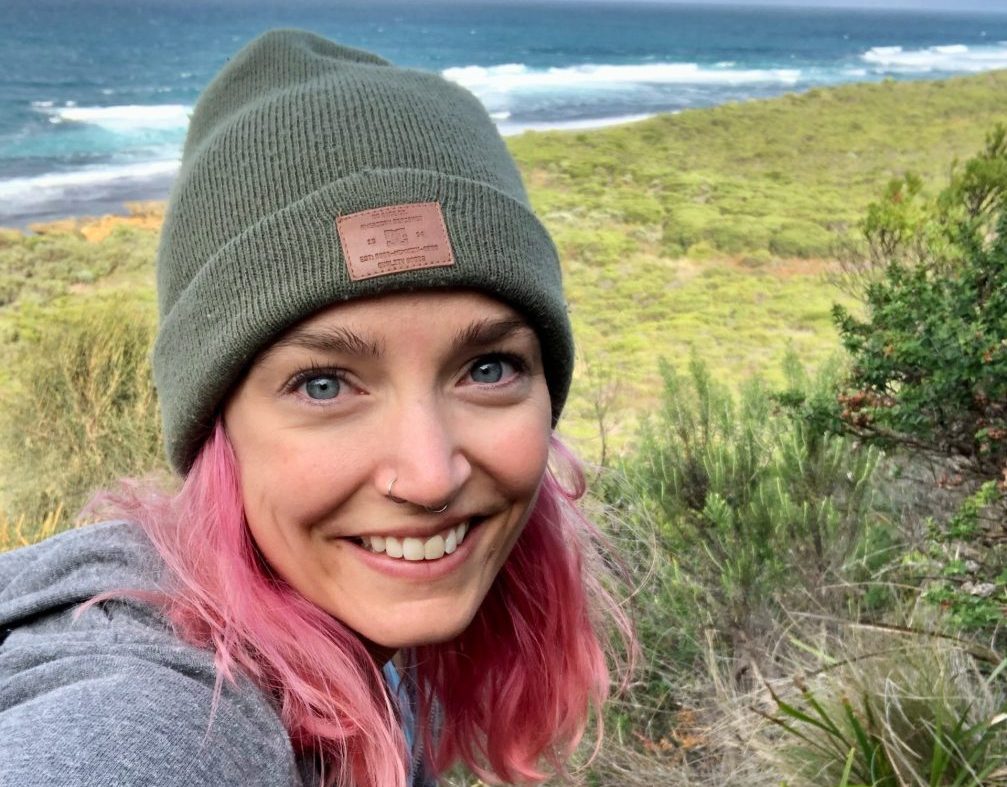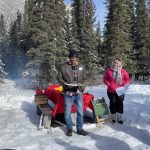Learn by Heart
In her own words, this month’s Guest Columnist Alyssa Nebel introduces readers to her Reflection Essay: Learn by Heart enviro_educ4374_learn-by-heart_alyssa-nebel
Preamble... In the final semester of my Education degree, I took a course in Environmental Education at one of the only schools in the country that makes such learning mandatory – Lakehead University in Thunder Bay, Ontario.
This course was undoubtedly one of the most unique learning experiences I’ve ever had the pleasure of participating in. For our first class, alongside thirty fellow students, we discovered a set of instructions in the classroom, and a map with directions to a nearby river. As such, on a cold January day in northwestern Ontario, our environmental education course began as we ambled across the campus, crossed a busy road, followed the map to a forest path, and found our professor reclining in a snowbank.
From across the river, Dr. Tom Puk, having never met us before, proceeded to recite poetry and then greeted each student with a personal salutation by calling our names, reciting them from memory. Dr. Puk highly values the arguably lost art of “learning by heart”. And so, I was introduced to this course and accepted the assignment: To memorize a passage of a William Wordsworth poem over a 9 week period, journal weekly about the experience, recite it from memory to Dr. Puk, and conclude the assignment with a final reflection of the entire process.
Throughout the process and in my reflection, I found an immeasurable abundance of gratitude. From my experience cross-country skiing along beautiful trails in northern Ontario, while reciting Wordsworth’s lines over and over, to a break from the monotony of academia by simply writing in a journal about my emotional connection to poetry and nature, I found gratitude. The experience of writing in my journal about my experience, called to mind my Aunt Lorrie’s book, Ecology of Gratitude (Widmer-Carson, 2021) and her Grassroots Gratitude project. Now, I am honoured to be featured in her guest column this month.
The Wordsworth words I reflected upon for this course assignment are from a passage from Lines Composed a Few Miles Above Tintern Abbey (published in 1798):
For I have learned
To look on nature, not as in the hour
Of thoughtless youth; but hearing oftentimes
The still sad music of humanity,
Nor harsh nor grating, though of ample power
To chasten and subdue.—And I have felt
A presence that disturbs me with the joy
Of elevated thoughts; a sense sublime
Of something far more deeply interfused,
Whose dwelling is the light of setting suns,
And the round ocean and the living air,
And the blue sky, and in the mind of man:
A motion and a spirit, that impels
All thinking things, all objects of all thought,
And rolls through all things. Therefore am I still
A lover of the meadows and the woods
And mountains; and of all that we behold
From this green earth; of all the mighty world
Of eye, and ear,—both what they half create,
And what perceive; well pleased to recognise
In nature and the language of the sense
The anchor of my purest thoughts, the nurse,
The guide, the guardian of my heart, and soul
Of all my moral being.
….
Excerpt from Alyssa’s paper:
Wordsworth had it right when he retreated to a few miles above Tintern Abbey to contemplate existence and write his gratitudes for that which gives life. He understood nature to be his “nurse,” providing health-promoting properties, nursing him back to health after facing the damages done by living in the industrial world. Nature was also his “guide,” showing him the way… the way to enlightenment… the way within. Nature, too, was his “guardian,” protector of his heart and soul, enveloping him in a cocoon of comfort and safety.
Nature, I realize now, was also his “God.” Wordsworth used the language of the day to communicate the spirituality he found there. He recognized Divinity in nature. He saw nature in himself and himself in nature so he found himself to be infused also with the Divine. The freedom and expansiveness one gains from such a realization is difficult to put into words. And yet, Words were his Worth, so he had no choice but to try. Anchoring this authentic knowing to the English language is somehow simultaneously a deep disservice and a great honoring.
Life itself is similarly paradoxical. As a human in this world, I crave nature, solitude, and quiet stillness, but I also require human connection. The practice of learning this poem passage “by heart” has similarly been both a solitary and a social practice. I have learned the lines alone, and then recited them to my partners, my friends, and my mother, helping to solidify those neural pathways. The practice of combining my learning with walking and skiing has helped to embody the poem within my muscles. And the practice of reflecting weekly on each line, finding emotional and intellectual connections to Wordsworth’s words has served to imprint this poem forever in my mind, and on my heart and soul.
Click here to read Alyssa Nebel’s excellent essay (as in 100% excellent): “Learn by Heart” enviro_educ4374_learn-by-heart_alyssa-nebel
References
Puk, T. (2021). Intree: embodied experience in a flat screen world. Journal of Outdoor and Environmental
Education, 24(1), 55–69. https://doi.org/10.1007/s42322-020-00073-4
Widmer-Carson, L. (2021). An ecology of gratitude: Writing your way to what matters. Grassroots
Gratitude: Lorraine Widmer-Carson.
Wordsworth, W. (1988). Lines composed a few miles above Tintern Abbey, on revisiting the banks of the
Wye during a tour. July 13, 1798. In S. Heaney (Ed.), William Wordsworth (pp. 34-38). Faber &
Faber Ltd.
About the author: Alyssa Nebel is a freshly certified teacher, but has long been an educator sharing teachings on the issues she is most passionate about, from social justice and gender equality, to environmental activism and food systems issues. She is excited to start her career as a school teacher, building relationships with students and community, inspiring others to change our world through kindness and gratitude. Alyssa is Lorraine Widmer-Carson’s niece, an avid journal writer, a self-professed board game nerd, and an explorer of the natural world through hikes, paddles, and global travel.
And in Lorraine’s words? Amen and Praise be to teachers, young creatives, poets, writers, environmental educators like Dr. Puk and all those who passionately advocate for spending time in Nature, writing from the heart, speaking from the heart and finding your reasons to be grateful.
Congratulations, Alyssa and to all who are graduating into their next phase of life with pens, journal, nature reflections and messages that resonate across the ages, messages that we can hold, savour, contemplate and commit to learning by heart.





